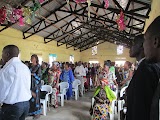Shalom University has decided to move towards a bi-lingual educational
structure, requiring English classes and teaching some required classes in
English so that students become fluent in both languages. Nearly everyone
with any education here knows at least two languages – Swahili and French, and
some know Lingala as well, the dominant Bantu language of western Congo. Most I meet can speak a smattering of
English, and everyone seems to want to learn it. Of course, Uganda and Kenya
are closer neighbours than Kinshasa (the capital, over 1,300 miles away by road,
although I cannot imagine how many days it might take to get there) and both of
them are English speaking, having been former British colonies. Rwanda just switched their official language
from French to English, and that left me wondering how they managed to do that.
In America, we are resistant to even learning metric, having pretty much managed
in the last thirty years to only accept 2 litre soda bottles.
Some schools in Congo already offering a bi-lingual educational
experience and those schools are increasingly desired. Ruth, my translator helper, goes to such a
school, and that is where she learned English.
For Shalom, the first step is obtaining an assessment of the
English level of its current students. Some of the students have studied in
Uganda and their English is fairly good. Some studied English in secondary
school (increasingly that is required), but others know very little, just a few
phrases. Shalom decided to test its
students – a written exam of 120 questions, grammar and vocabulary, followed by
an oral exam to test verbal fluency. For
whatever reason, they wanted it done in one day, so they recruited all the
English speakers they could muster to help with the oral part of the exam. I was asked to help because, as Jehoshaphat
(dean of the theology school) said in a meeting about the exam, I speak good
English. Several of the attendees at that meeting laughed, but he was serious. He said you
cannot understand many Americans – they talk to fast, they use too much slang,
and they do not pronounce words clearly. He was complimenting my English, although he was not saying I spoke English well, just that I spoke good English. I imagine American pronunciation is difficult
for many of them, as African English speakers more closely model British
English. As I sat in the meeting listening to the others, though, I thought
some of them were probably not the best to be giving an oral exam on fluency …
I was happy to help out, an excuse to put aside accounting
for a day. We worked in pairs, and the
idea was to start by asking simple questions, increasing the level of
complexity depending on their level of English proficiency. If the student
was fairly fluent, we were to ask them if they wanted to ask us any
questions, to see if they could sustain a two way conversation. It was
interesting to interact with the students, hearing how long it took them to get
to school each day (and for some, an hour or more – I wondered if many American
college students would hunger enough for an education to walk an hour to get to
school each day…), why they wanted to study English (they all said it is the international
language ) and what they would do if they were given
$1,000. Many could barely speak any English and those interviews went quickly. One
young girl struggled especially, and seemed both flustered and embarrassed at
her lack of English. I was ready to tell
her sawa (it’s okay), we are finished, when the other tester asked her if she
wanted to ask either of us a question.
She perked up and said yes, clearly understanding the question. She turned quickly and deliberately to me and asked in
very clear English, “How old are you?”
I certainly was not expecting that! Most of the students wanted only to
know where I was from, or if I had children. I told her, what did I care (I turned
63 in Congo!) and asked her if she wanted to ask me anything else. She said, very clearly again, “no”. Either my grey hair captured her attention (I have
seen only one Congolese with grey hair so far) or it was the only question she
knew how to ask in English!
All in, the school was very appreciative for my help, but I
realize that with only two native English speakers around, it was not as if
they had many to choose from. Now I am helping
grade the written exams, and there are errors in the answer key. Hmm, well it is only a placement exam…
Update: It rained torrents last night, so many thanks for those who have been praying for
rain. I understand better the huge ruts
in the road – it rains so hard it simply washes gullies into the road as there are no runoff sewers or trenches, and as
the cars and motorcycles run through the mud, it makes them deeper. But it was
so much more pleasant to walk around, even if one had to step around mud holes.
No dust on most of the roads.
Day 33 without electricity, and I am learning that I can
actually manage pretty well without it, at least here in Congo. Of course, I am walking
around in crumpled, wrinkly clothes… Hmm, maybe that is why that girl asked me how old I was. All she saw was one huge wrinkle...








.JPG)
